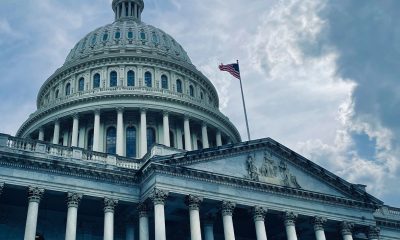National
Waiting for Justice
Civil Rights ‘Cold Cases’ Drag On

Special to the NNPA from The Florida Courier
Juanita Evangeline Moore hates Christmas.
It was on Christmas night 1951 when her father, Harry T. Moore, was murdered instantly when a bomb placed by racists exploded under the family’s Mims home. Nine days later, her mother Harriette V. Moore died as a result of injuries sustained in the bombing.
The Moores were some of the earliest civil rights leaders in Florida and began their work in Brevard County. Harry Moore, a graduate of Bethune-Cookman College (now University), was the Florida state field secretary for the NAACP. He fought for equal pay for teachers, spoke out against violent atrocities against African-Americans, and registered thousands of voters.
At the time they were killed, Harry Moore, who also founded the Brevard County chapter of the NAACP, was registering large numbers of Blacks to vote and protesting the circumstances around a rape trial in Groveland – including the killings of two of the defendants by the Lake County sheriff.
Such activism, in a state still under the harsh rule of Jim Crow, drew the ire of the Ku Klux Klan.
Circumstantial Evidence
In 2006, Florida’s then-Attorney General Charlie Crist spoke about the Moores’ murders under a rambling oak tree just yards from where the Moore home stood, now the site of a cultural center honoring the couple.
Crist said strong circumstantial evidence – unearthed during a 20-month investigation – pointed to ultra-violent factions within the KKK “as being responsible for this horrible act.’’
In the Moore case, investigators interviewed more than 100 people and combed through 50 years of documents. The bombsite was even excavated, though it yielded no new evidence.
But the stories of witnesses did. They told of a particularly violent group of men who were working to squash the efforts of the Moores. Those implicated were Earl J. Brooklyn, Tillman H. Bevlin, Joseph N. Cox and Edward L. Spivey. Crist, who said others may have been involved, failed to elaborate on the roles each man played.
All Dead
Spivey reportedly confessed to investigators and an anonymous tipster before his death from cancer in 1980. But by that time, the case was nearly 30 years old and the other three men were long dead.
Bevlin died less than a year after the bombing, reportedly of natural causes. Brooklyn died on the attack’s one-year anniversary, and Cox committed suicide in 1952 – one day after an interview with the FBI about the case.
Investigators said Brooklyn and Bevlin had floor plans of the Moore home, and Cox may have been rewarded with a paid-off mortgage for participating in the crime. Spivey is believed to have been at the home on the night of the bombing.
‘Never Have Closure’
Sixty-three years later, Moore has given up hope that her parents will receive justice. She was praying that the four suspects in the killings would be formally named as suspects when she received a letter from the FBI telling her that investigators had been unable to find anything that would help them to definitively identify the culprits.
“I haven’t heard from them since. I guess I will never have closure,” said Moore, of New Carrollton, Maryland.
Moore, 84, is among hundreds of loved ones of men, women and children killed in decades-old civil rights cases who still yearn to have someone held accountable for the killings.
Congress Acts
In 2007, at the urging of civil rights activists, Congress passed the Emmett Till Unsolved Civil Rights Crimes Act that was named for 14-year-old Emmett Till, a Chicago youth who, in 1955, was brutalized and killed by racists in Money, Miss. after he whistled at a White woman.
At a panel discussion Dec. 9 at Washington, D.C’s National Press Club, relatives of civil rights murder victims described their efforts to see done for their loved ones. The event was sponsored by the Cold Case Justice Initiative (CCJI) of the Syracuse University College of Law, one of a handful of university-based programs where law students investigate civil rights murders.
“For years, I didn’t know anything about what happened. I guess my mom didn’t want us to know what went on because we still live in that town,” said Darlene Morris-Newbill, 41, whose great grandfather, Frank Morris, died after he was set on fire by racists in Ferriday, La., in 1964. The case was investigated by the CCJI and turned its research over to the Department of Justice, which said it was unable to determine or prosecute a culprit.
Speakers urged Congress to extend the Till Act, which is set to expire in 2017. Under the act, Congress appropriated funding to the DOJ to investigate unsolved civil rights murder cases and, whenever possible, to bring killers to justice.
The panel included Rep. Sheila Jackson-Lee (D-Texas); Emmett’s cousin, Thelma Edwards, who still remembers the night he was snatched from her parent’s home at gunpoint; Paul Delaney, a former editor at the New York Times who wrote extensively about civil rights murders; and Paula Johnson and Janis McDonald, the Syracuse law professors who co-direct the CCJI.
Avis Thomas-Lester of NNPA and the Washington Informer contributed to this report.
Activism
Oakland Post: Week of April 16 – 22, 2025
The printed Weekly Edition of the Oakland Post: Week of April 16 – 22, 2025

To enlarge your view of this issue, use the slider, magnifying glass icon or full page icon in the lower right corner of the browser window.
#NNPA BlackPress
UPDATE: PepsiCo Meets with Sharpton Over DEI Rollbacks, Future Action Pending
BLACKPRESSUSA NEWSWIRE — The more than hour-long meeting included PepsiCo Chairman Ramon Laguarta and Steven Williams, CEO of PepsiCo North America, and was held within the 21-day window Sharpton had given the company to respond.

By Stacy M. Brown
BlackPressUSA.com Senior National Correspondent
Rev. Al Sharpton met Tuesday morning with PepsiCo leadership at the company’s global headquarters in Purchase, New York, following sharp criticism of the food and beverage giant’s decision to scale back nearly $500 million in diversity, equity, and inclusion (DEI) initiatives. The more than hour-long meeting included PepsiCo Chairman Ramon Laguarta and Steven Williams, CEO of PepsiCo North America, and was held within the 21-day window Sharpton had given the company to respond. Sharpton was joined by members of the National Action Network (NAN), the civil rights organization he founded and leads. “It was a constructive conversation,” Sharpton said after the meeting. “We agreed to follow up meetings within the next few days. After that continued dialogue, NAN Chairman Dr. W. Franklyn Richardson and I, both former members of the company’s African American Advisory Board, will make a final determination and recommendation to the organization on what we will do around PepsiCo moving forward, as we continue to deal with a broader swath of corporations with whom we will either boycott or buy-cott.”
Sharpton initially raised concerns in an April 4 letter to Laguarta, accusing the company of abandoning its equity commitments and threatening a boycott if PepsiCo did not meet within three weeks. PepsiCo announced in February that it would no longer maintain specific goals for minority representation in its management or among its suppliers — a move that drew criticism from civil rights advocates. “You have walked away from equity,” Sharpton wrote at the time, pointing to the dismantling of hiring goals and community partnerships as clear signs that “political pressure has outweighed principle.” PepsiCo did not issue a statement following Tuesday’s meeting. The company joins a growing list of major corporations — including Walmart and Target — that have scaled back internal DEI efforts since President Donald Trump returned to office. Trump has eliminated DEI programs from the federal government and warned public schools to do the same or risk losing federal funding. Sharpton has vowed to hold companies accountable. In January, he led a “buy-cott” at Costco to applaud the retailer’s ongoing DEI efforts and announced that NAN would identify two corporations to boycott within 90 days if they failed to uphold equity commitments. “That is the only viable tool that I see at this time, which is why we’ve rewarded those that stood with us,” Sharpton said.
#NNPA BlackPress
Target Reels from Boycotts, Employee Revolt, and Massive Losses as Activists Plot Next Moves
BLACKPRESSUSA NEWSWIRE — Target is spiraling as consumer boycotts intensify, workers push to unionize, and the company faces mounting financial losses following its rollback of diversity, equity, and inclusion (DEI) initiatives.

By Stacy M. Brown
BlackPressUSA.com Senior National Correspondent
Target is spiraling as consumer boycotts intensify, workers push to unionize, and the company faces mounting financial losses following its rollback of diversity, equity, and inclusion (DEI) initiatives. With foot traffic plummeting, stock prices at a five-year low, and employee discontent boiling over, national civil rights leaders and grassroots organizers are vowing to escalate pressure in the weeks ahead. Led by Georgia pastor Rev. Jamal Bryant, a 40-day “Targetfast” aligned with the Lenten season continues to gain traction. “This is about holding companies accountable for abandoning progress,” Bryant said, as the campaign encourages consumers to shop elsewhere. Groups like the NAACP, the National Newspaper Publishers Association, and The People’s Union USA are amplifying the effort, organizing mass boycotts and strategic buying initiatives to target what they call corporate surrender to bigotry.
Meanwhile, Target’s workforce is in an open revolt. On Reddit, self-identified employees described mass resignations, frustration with meager pay raises, and growing calls to unionize. “We’ve had six people give their two-week notices,” one worker wrote. “A rogue team member gathered us in the back room and started talking about forming a union.” Others echoed the sentiment, with users posting messages like, “We’ve been talking about forming a union at my store too,” and “Good on them for trying to organize—it needs to happen.” Target’s problems aren’t just anecdotal. The numbers reflect a company in crisis. The retail giant has logged 10 straight weeks of falling in-store traffic. In February, foot traffic dropped 9% year-over-year, including a 9.5% plunge on February 28 during the 24-hour “economic blackout” boycott organized by The People’s Union USA. March saw a 6.5% decline compared to the previous year. Operating income fell 21% in the most recent quarter, and the company’s stock (TGT) opened at just $94 on April 14, down from $142 in January before the DEI cuts and subsequent backlash. The economic backlash is growing louder online, too.
“We are still boycotting Target due to them bending to bigotry by eroding their DEI programs,” posted the activist group We Are Somebody on April 14. “Target stock has gone down, and their projections remain flat. DEI was good for business. Do the right thing.” Former congresswoman Nina Turner, a senior fellow at The New School’s Institute on Race, Power and Political Economy, wrote, “Boycotts are effective. Boycotts must have a demand. We will continue to boycott until our demands are met.” More action is on the horizon. Another Target boycott is scheduled for June 3–9, part of a broader campaign targeting corporations that have abandoned DEI initiatives under pressure from right-wing politics and recent executive orders by President Donald Trump. The People’s Union USA, which led the February 28 boycott, has already launched similar weeklong actions against Walmart and announced upcoming boycotts of Amazon (May 6–12), Walmart again (May 20–26), and McDonald’s (June 24–30). The organization’s founder, John Schwarz, said the goal is nothing short of shifting the economic power balance.
“We are going to remind them who has the power,” Schwarz said. “For one day, we turn it off. For one day, we shut it down. For one day, we remind them that this country does not belong to the elite, it belongs to the people.” As for Target, its top executives continue to downplay the damage. During a recent earnings call, Chief Financial Officer Jim Lee described the outlook for 2025 as uncertain, citing the “ripple” effects of tariffs and a wide range of possible outcomes. “We’re going to be focusing on controlling what we can control,” Lee said. But discontent is spreading internally. A Reddit post from a worker claimed, “The HR rep is doing his best to stop the bleeding, but all he did was put a Bluey band-aid on what is essentially a severed limb.”
Several employees criticized the company’s internal rewards system, “Bullseye Bucks,” for offering what amounts to play money. “Can’t pay rent or buy food with Bullseye Bucks,” one wrote. Others urged their colleagues to join unionizing efforts. “Imagine how much Target would lose their mind if they were under a union contract,” one team leader wrote. “It needs to happen at this point.” One former manager said they left the company after an insulting raise. “Quit last year when they gave me a 28-cent raise. Best decision I’ve ever made.” From store floors to boardrooms, the pressure is growing on Target. And as calls for justice, equity, and worker rights get louder, one worker put it plainly: “We’re all screwed—unless we fight back.”
-

 Activism4 weeks ago
Activism4 weeks agoWe Fought on Opposite Sides of the Sheng Thao Recall. Here’s Why We’re Uniting Behind Barbara Lee for Oakland Mayor
-

 Activism4 weeks ago
Activism4 weeks agoOakland’s Most Vulnerable Neighborhoods Are Struggling to Eat and Stay Healthy
-

 Activism4 weeks ago
Activism4 weeks agoFaith Leaders Back Barbara Lee for Mayor, Criticize Candidate Loren Taylor for Dishonest Campaigning
-

 Activism3 weeks ago
Activism3 weeks agoOakland Post Endorses Barbara Lee
-

 Activism4 weeks ago
Activism4 weeks agoGroup Takes First Steps to Recall District Attorney Diana Becton
-

 Activism4 weeks ago
Activism4 weeks agoOakland Post: Week of March 19 – 25, 2025
-

 Alameda County4 weeks ago
Alameda County4 weeks agoTrump Order Slashes Federal Agencies Supporting Minority Business and Neighborhood Development
-

 Activism4 weeks ago
Activism4 weeks agoSen. Lola Smallwood-Cuevas Honors California Women in Construction with State Proclamation, Policy Ideas


















































